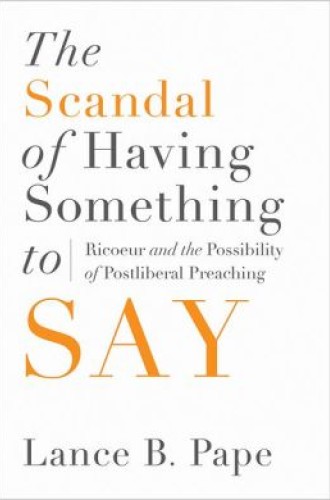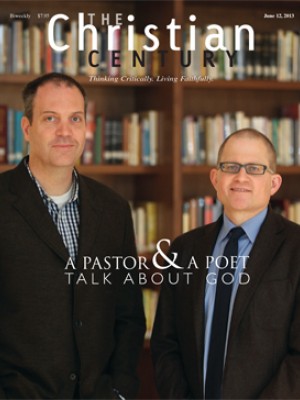The Scandal of Having Something to Say, by Lance B. Pape
Perhaps the best entry point into The Scandal of Having Something to Say is the word postliberal in the subtitle, which requires that we consider the term liberal, to which this perspective is “post.” The term liberal most comprehensively relates to Enlightenment rationality, which posits an autonomous self which can arrive at a one-dimensional certitude. With regard to scripture study it refers to historical criticism, which seeks to locate each text in context and to contain it therein.
When applied to preaching, the liberal approach may take one of two extreme forms. The progressive option features a kind of naturalism that refuses the notion of revelation and the supernaturalism of miracles, along with the tradition that attested them. One can see how historical criticism helped to explain away what was unintelligible to this rationality: “It is the Sea of Reeds, not the Red Sea.” The second liberal approach, in response to such progressivism, is a conservative attempt to reduce unmanageable mystery to a set of propositions that can provide a reassuring certitude.
Read our latest issue or browse back issues.
Both modes of liberal preaching are alive and well as the body of Christ is divided up, like Christ’s robe, into blue and red. The problem with such approaches is that they leave one with nothing to say: nothing for progressives to express except ethical admonitions, nothing for conservatives to convey except concepts, neither telling any gospel news that could be transformative. Progressives have been epistemologically embarrassed by the gospel, and conservatives are tempted to a reductionism that knows too much.
The "post" in postliberal signifies attempts to move beyond interpretive efforts that reflect the 18th-century rationalism preferred by conservatives, on the one hand, and the 19th-century evolutionism preferred by progressives, on the other. Only in such a move might preachers again have something to say—something dangerous, transformative, compelling and trustworthy.
A professor of homiletics at Brite Divinity School, Lance Pape offers here a critical reflection on the major postliberal figures and suggests how preaching might be different in their wake. Of course, the key figure is Karl Barth, who broke decisively and explosively with the liberalism of his teachers and his church. Pape celebrates Barth’s readiness to preach the cross but points to the inadequacy displayed in Barth’s homiletical verdict: “First, God is the one who works, and second, we humans must try to point to what is said in scripture. There is no third thing.”
It is the “third thing,” which Barth denies in principle but uses in his own preaching, that is the subject of this book, namely, attentiveness to the role of language and the art of communication whereby the sermon becomes a form of God’s free act of self-communication. Such communication must be more than the announcement of an idea. This assertion leads Pape to the complex subject of semiotics and to the decisive contributions to postliberal theology and preaching made by Hans Frei and Paul Ricoeur.
Frei receives a full chapter of consideration here. His emphasis was recovery of the “literal sense” of scripture before the matter was distorted by Enlightenment rationality. The term literal has, in modern usage, been taken to mean historically factual. What is literal really happened. Prior to the Enlightenment, literalism meant simply taking text as it is, as a “true, complete, and unified account of the ‘one and only real world’ spanning all of natural and human history.” Such a realistic narrative did not appeal to subject matter outside of the story, but stayed inside the story. Therefore, the testimony of the text did not need to be—and could not be—assessed by external norms, logical or empirical. Literalist preaching in this sense would make its claims on the basis of the text, without apology and without epistemological embarrassment.
Pape’s discussion of Frei is matched by his extended consideration of Ricoeur, who urged dwelling within the text, took the text as adequate in itself and found that the text originated and generated new worlds in which to dwell. He considered the comprehensive genre of the biblical text to be a testimony that, with an appeal to acute particularity, witnesses to a reality, a truth and a reliability that are beyond the voice of the preacher.
Ricoeur saw that such testimony requires listening (not initiating or generating) that “excludes the founding self.” This listening is an act of “radical self-divestment” that renounces both the absolute object and the absolute subject. In its poetic idiom, the text “imagines and displays” an alternative world. With his focus on generative imagination, Ricoeur took away the explanatory power of the preacher and the adjudicating capacity of the congregation. He cast the preacher and the congregation as the ones addressed by a new reality that is given in a moment of testimony concerning God, a moment that is “extraordinarily fragile” but that is not subject to our usual measures of assessment.
After this hefty, dense review of Frei and Ricoeur, Pape suggests three common features of these two guides to postliberal interpretation. First, Frei and Ricoeur agree that “narrative is integral to the Christian understanding of God.” It is for that reason that “we love to tell the story.” Second, they agree that such narrative testimony makes available an alternative world that is not subject to the restraints, validation or critique of Enlightenment rationality.
Third, and surely most surprising, Frei and Ricoeur agree that full access to the world given by the text requires “one’s cooperative disposition toward the text,” which entails a “vow of obedience” and a “vow of rigor.” Such readiness as the precondition of sermonic proclamation constitutes a huge demand on both preacher and congregation, whether progressive or conservative, that is almost completely inured to Enlightenment rationality. But of course that is what is “post” in postliberal.
The test of such dense theory is, of course, sermonic performance. Pape concludes his discussion by reviewing two sermons according to these criteria, one by “an anonymous student” and one by this reviewer. I am glad to report that my own sermon largely meets Pape’s expectations of postliberal proclamation.
Because it is my sermon, I suppose I am free to make two comments on it. First, such preaching, toward which I have long been moving, has required me to unlearn much of what I have learned about scripture interpretation and preaching. In retrospect, I see that I was taught to interpret and preach in a liberal way that I now know to be ineffective in terms of generating transformative missional energy.
Second, when I wrote that sermon I did not deliberately make any moves that would echo Frei or Ricoeur. Rather, I had already spent decades learning from them, so by the time I wrote the sermon their work was part of me. One cannot do postliberalism by imitating Ricoeur anymore than a good cook precisely follows recipes.
This is an important book, but it is too brief and too dense in itself. It will, however, encourage and invite a more sustained analysis of Frei and Ricoeur. The outcome of this work will be a greater capacity to preach the cross, which is God’s great contradiction to the claims of empire.
This preaching will be pertinent for those who are ready to ask, “Is there any word from the Lord?” In response, the preacher may have something to say!







